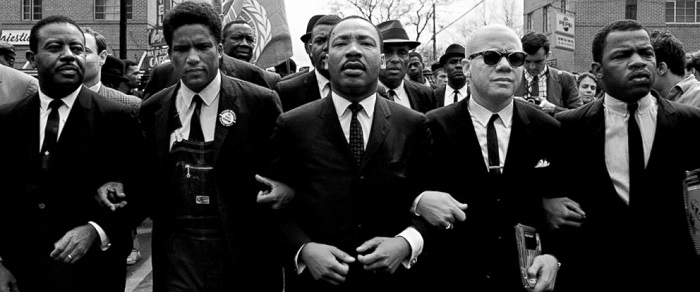
I wasn’t planning on writing a timely post for Martin Luther King day this year, but I saw something yesterday that inspired me to do so: I watched David Letterman’s recent interview with Barack Obama, and when the far-ranging conversation turned to civil rights, Letterman recalled walking with John Lewis across the Edmund Pettus Bridge in Selma, Alabama, 50 years after the Selma-to-Montgomery marches of 1965.
As you may already know, during the first march (a legal, nonviolent protest against discriminatory voting regulations), state troopers attacked the unarmed marchers with nightsticks and tear gas, and even beat Amelia Boynton (one of the march’s organizers) until she was unconscious.
Although this horrific experience (known as “Bloody Sunday”) was a major setback, the marchers were not defeated. Two days later, when they returned to the location for a “Turnaround Tuesday” march, their numbers had swelled to nearly five times the size of the original march, as they were joined by sympathizers from all around the country, including Martin Luther King.
This event, however, was also not the success they had envisioned, as they were forced to discontinue the march long before they reached Montgomery. Also, after the march, KKK members attacked and killed James Reeb, a minister from Boston who was in town for the march.
But even this second round of setbacks and tragedy did not stop the movement. In fact, less than two weeks later, the marchers returned — and this time they realized their original vision. By the time they reached Montgomery (on March 25, 1965, with federal protection and nationwide support), they had been joined by approximately 25,000 supporters — almost 50 times the number of people as had started the original march!
The marches were not merely a symbolic success. Between the second and third marches, President Johnson introduced the Voting Rights Bill to prohibit racial discrimination in voting; that summer, he signed the bill into law.
Hearing this story recounted, I was incredibly moved by the strength and bravery of the marchers in 1965, and I was also filled with hope for the present and future. At a time when it’s so easy to lose hope — to feel your spirit crushed by personal and social setbacks — it’s encouraging to remember that others have prevailed over setbacks…and emerged with even greater strength!
I realize that the victories of 1965 weren’t absolute or permanent. The pendulum swings back and forth. Discrimination is not over, and John Lewis and other civil-rights advocates still come under attack for their efforts to advance equality and justice. But the example of John Lewis, Martin Luther King, and the other marchers in Selma renewed my faith that oppression of truth, justice, and freedom will be met with a magnified surge of soulful strength and peaceful power.
So if you’re feeling disheartened at seeing the resurgence of a newly emboldened KKK, the disparagement of black people in the U.S. and around the world, or other examples of bigotry (such as Islamophobia or anti-LGBT discrimination), find hope in the Civil Rights Movement, which overcame setbacks and came back stronger than ever!
And the same holds true in ALL areas of your life: If you face personal setbacks, obstacles, attacks (of any kind), or even tragedies, please know that this does not need to be the end of the road for you. You too can rise up even stronger, you can recommit to your values with redoubled vigor, and you can reach your dreams.
On this day of national remembrance, may these reminders bring you a renewed sense of faith, optimism, and hope.
…
Photograph by Steve Schapiro: John Lewis (far right) marches to Montgomery, Alabama, in March 1965 with the Rev. Ralph David Abernathy, James Foreman, the Rev. Martin Luther King Jr. and Jesse Douglas.
